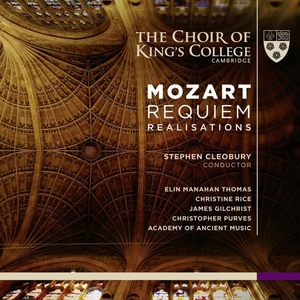
Born in Salzburg, then in the Holy Roman Empire and currently in Austria, Mozart showed prodigious ability from his earliest childhood. Already competent on keyboard and violin, he composed from the age of five and performed before European royalty. His father took him on a grand tour of Europe and then three trips to Italy. At 17, he was a musician at the Salzburg court but grew restless and traveled in search of a better position.
While visiting Vienna in 1781, Mozart was dismissed from his Salzburg position. He stayed in Vienna, where he achieved fame but little financial security. During his final years there, he composed many of his best-known symphonies, concertos, and operas. His Requiem was largely unfinished by the time of his death at the age of 35, the circumstances of which are uncertain and much mythologized.
Requiem: Dies irae
Wolfgang Amadeus Mozart Lyrics
Jump to: Overall Meaning ↴ Line by Line Meaning ↴
Solvet sæclum en favilla
Teste davidcum sybilla
Quantus tremor est futurus
Quando judex est venturus
Cunta stricte discus surus
Solvet sæclum en favilla
Teste davidcum sybilla
Quantus tremor est futurus
Quando judex est venturus
Cuncta stricte discus surus
Quantus tre-e-mo-or e-est fu-u-turus
Dies irae, Dies illa
Quantus tre-e-mo-or e-est fu-u-turus
Dies iræ, Dies illa
Quantus tre-e-mo-or e-est fu-u-turus
Quando judex est venturus
Cuncta stricte discus surus
Cuncta stricte
Stricte discus surus
Cuncta stricte
Stricte discus surus
The lyrics to Wolfgang Amadeus Mozart's song Requiem, Dies irae is a reflection on the end of time, where the world is destroyed by fire and all souls are judged. The song begins with "Dies irae, dies illa," which translates to "Day of wrath, that day," and is followed by "Solvet sæclum en favilla," meaning "will dissolve the world in ashes." The reference to David and Sibylle is a reference to the biblical prophecies of David and the ancient Roman prophetess, Sibylle, both of whom predicted the end of the world.
The chorus is repeated twice, and the following lines reflect on the fear and trembling that will come with the arrival of the judge who will be responsible for deciding who goes to heaven or hell. "Quantus tremor est futurus" translates to "What trembling there will be," and "Quando judex est venturus" means "when the judge is coming." The final line, "Cuncta stricte discus surus," expresses the seriousness and strictness of the judgment that is to come.
The song explores themes of judgment, fear, and the end of the world, with the ultimate message being that we must live our lives in accordance with our faith in order to be prepared for the final judgment.
Line by Line Meaning
Dies iræ, dies illa
Oh, what a day of wrath that will be
Solvet sæclum en favilla
When the world will be reduced to ashes
Teste davidcum sybilla
As foretold by David and the Sibyl
Quantus tremor est futurus
What trembling there will be
Quando judex est venturus
When the judge will come
Cunta stricte discus surus
To judge everything strictly
Dies irae, dies illa
Oh, what a day of wrath that will be
Solvet sæclum en favilla
When the world will be reduced to ashes
Teste davidcum sybilla
As foretold by David and the Sibyl
Quantus tremor est futurus
What trembling there will be
Quando judex est venturus
When the judge will come
Cuncta stricte discus surus
To judge everything strictly
Cuncta stricte
Everything will be judged strictly
Stricte discus surus
Judged strictly
Writer(s): Verdi
Contributed by Jack F. Suggest a correction in the comments below.
@anthonyhoad6604
Day of wrath and doom Impending,
David's words with Sibyl's blending, Heaven and Earth in ashes ending.
Oh what fear man's bosom rendeth, when from heaven the Judge descendeth,
on whose sentence all dependeth.
Wondrous sound the trumpet flingeth, through earth's sepulchers it ringeth,
All before the Throne in bringeth.
From the dust of earth returning: man for judgement must prepare him.
Spare O God, in mercy spare him.
Lord all-pitying, Jesus blest, Grant them thine eternal rest. Amen
Atziluth (Emanation)
Du-Sollst - Dies Irae (Pour forth from the chaos - Day of Wrath)
@maudpie1338
Try listening to songs like this while doing homework. Feels like writing names in a death note.
@hafler617
I have a death note lol
@KingBamboozle
@Ryan Du FBI OPEN UP!!!
@UN0WNPR
I takeba potato chip
AND EAT IT!!
@bloodwoot
@Iwan Yusazli dramaticly moving pen while writing the names
@VyvienneEaux
For a couple weeks I did my homework at 3:00 AM listening to Mozart's requiem. I felt magical.
@shiviste7611
Perfect music for fighting Ivan the Terrible
@johnapple6646
I knew you idiots would come here
@matiasbarraza2181
@John Apple What are you talking about?
@nobbu-sengumi
Leave the weeb shit at home. Jk.